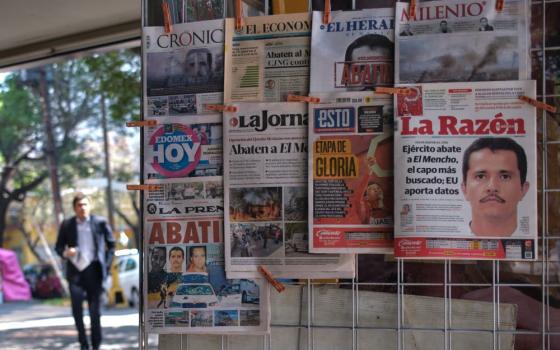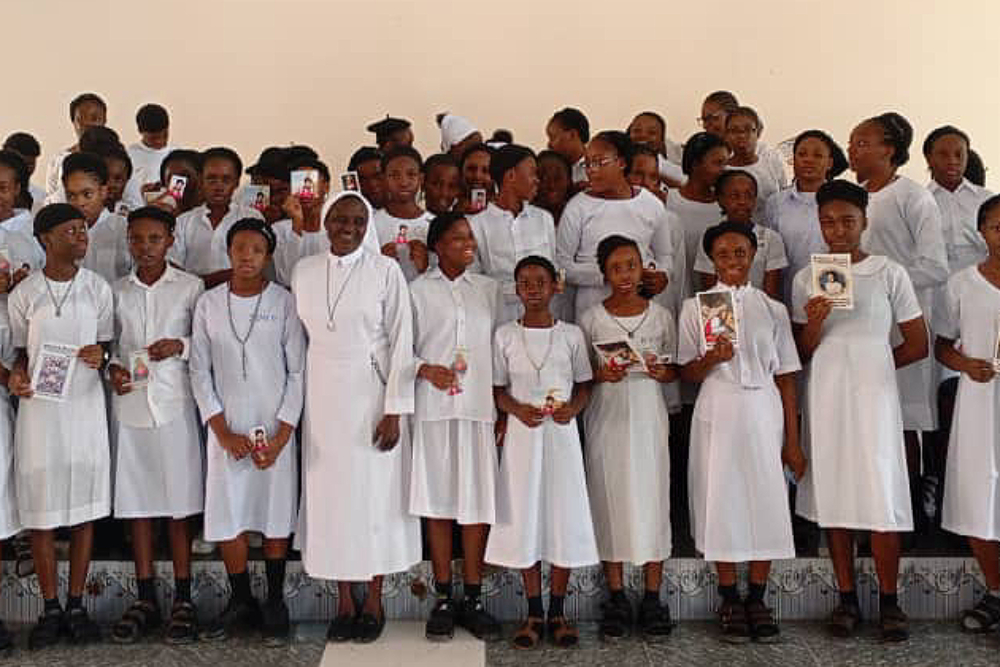
Antonia Uche during her visit to the Government Science Technical College in Garki, Abuja, Nigeria, to enroll students in the Universal Living Rosary Association in January 2025. (Courtesy of Antonia Uche)

To say "yes" to religious life is to begin a journey of encounters — with God, with community and with the world around us. Along the way, we meet surprises, face challenges and receive countless blessings that shape who we are and how we serve God's people.
This month, we asked our panelists the following question:
"What has been the greatest gift of your vocation?"
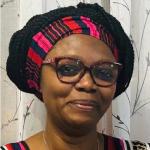
Anne Arabome is a member of the Sisters of Social Service in Los Angeles with Nigerian origins and naturalized U.S. citizenship. She previously served as associate director of the Faber Center for Ignatian Spirituality at Marquette University. In 2024, she relocated to Windhoek, Namibia, where she founded and directs the Sophia Institute for Theological Studies and Spiritual Formation. She is also directing the project of theological studies and intercongregational living in Scotland under the auspices of CORLIN. A faith-filled Catholic woman religious, she is deeply committed to ministry, social justice and scholarship, focusing on the spiritual lives of African women and Ignatian spirituality. She holds a doctorate in systematic theology and a Doctor of Ministry in Spirituality.
Looking back over the years of my religious life, friendship with God stands out as the greatest gift of my vocation. It is a friendship that continues to deepen through joy, struggle, service and sacrifice.
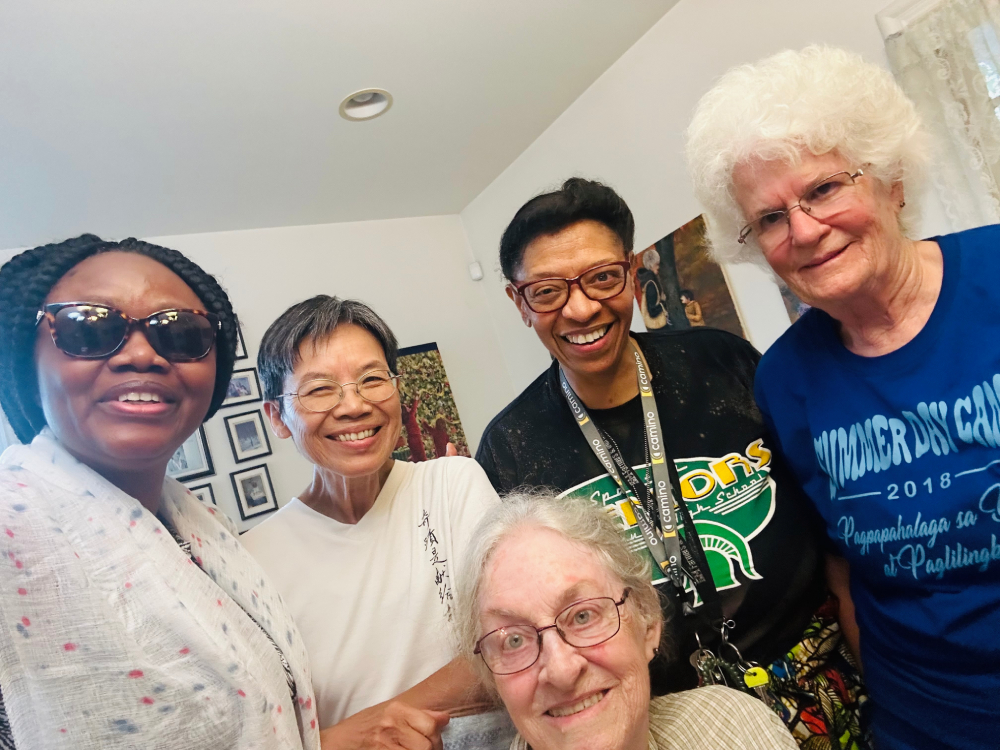
From left to right: Sr. Anne Arabome, Sr. Theresa Marie Chen, Sr. Deborah Lorentz (center front), Sr. Betty Harbison and Sr. Michele Walsh. (Courtesy of Anne Arabome)
As an African woman religious, relationality is constitutive of my being and outlook on life. This reality is expressed in the principle of ubuntu. Thus, my life is rooted in deep friendship with the God who liberates and fills us with life. Through my formative years in Nigeria and the United States, and in every ministry I have undertaken, I have grown in intimacy with God through contemplative prayer and encounter. This friendship opens me to others in an incarnational way. God becomes one with me at all times.
In my teaching and spirituality sessions at Sophia Institute or Hekima University College, I often tell my students that my favorite song is "Silent Night." I sing it with them to express the power of the Incarnation — of God who takes our form and feels with us. It surprises them that I speak of Jesus so personally, as my friend. Yet this is what I understand religious life to be: a spousal, intimate relationship that defines my whole being. At the heart of my vocation is not what I do, but who I am becoming in God's love.
Friendship with God is not a dated event, but a daily encounter. I also struggle with the term "final vows," because friendship is never final — it grows and deepens until our last breath. —Sr. Anne Arabome
My community life has taught me the meaning of friendship with God. Our charism, rooted in the Holy Spirit, calls us to the frontiers to bring liberation where it is needed most. Our foundress, Margaret Slachta, said, "It is not enough to wipe away the tears, but to eradicate the cause of the tears." My friendship with God in Christ urges me to live this mission daily.
I recall the time when my sisters reminded me of my 25th anniversary of profession. The word "anniversary" makes me uneasy. Friendship with God is not a dated event, but a daily encounter. I also struggle with the term "final vows," because friendship is never final — it grows and deepens until our last breath.
Each day, I rest with my friend in prayer, asking for grace in moments of darkness and gratitude in moments of light, while celebrating becoming who God desires me to be.
Advertisement
Through this friendship, community life has stretched my heart and deepened my capacity to love. At Sophia Institute, I see this same friendship reflected — hundreds of sisters encountering Christ in new and transforming ways.
To live this vocation is to live in friendship — with God, with others, and with creation. That friendship, ever deepening, remains the greatest gift of my vocation.
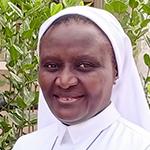
Antonia O. Uche, a Nigerian, is a member of the Congregation of the Handmaids of the Holy Child Jesus. With a strong academic background in education, languages, refugee studies and psycho-spiritual counseling, she lives and works in Nigeria. Her diverse ministry experience includes roles as a French teacher, school administrator at both primary and secondary levels, and university lecturer. Currently, she serves as a counselor at Veritas University in Abuja. She is also involved in parish ministry and women's rights advocacy, and has served on a provincial leadership team within her congregation.
To D. T. Niles is attributed the definition of evangelization as one beggar telling another where she found bread. As a religious sister professed for decades, I have come to appreciate more fully the ineffable treasure that my vocation is — the greatest blessing of my life after Baptism. But then, what has been the greatest gift of my vocation? I rephrase the question this way: How does this unfazed beggar help other beggars access the imperishable bread of eternal life?
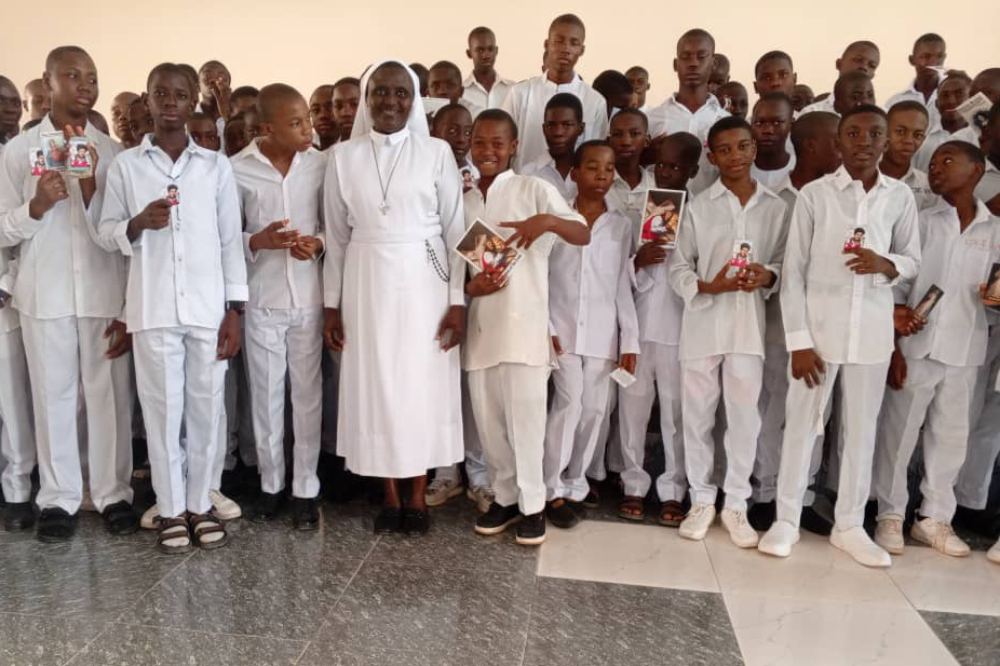
Antonia Uche during her visit to the Government Science Technical College in Garki, Abuja, Nigeria, to enroll students in the Universal Living Rosary Association in January 2025. (Courtesy of Antonia Uche)
Loved, chosen and consecrated even before I was born (Isaiah 49:1; Jeremiah 1:5), and commissioned to bear fruit that will last (John 15:16), I have been blessed and joyful in my vocation. Yes, it is also a gently impelling obligation to share the riches of the Catholic faith with my sisters and brothers from different walks of life. I do this not as the primary evangelizers, aka missionaries — but by gleaning in the field after the reapers, like Ruth. My focus has been reducing ignorance and apathy in religious matters among the already evangelized. This is driven by the lament of the Lord through the prophet Hosea: "My people perish for lack of knowledge."
Opportunities for faith education arise in my apostolate in the school, during parish and school pastoral engagements and in visits with families. These groups require much exhausting but fruitful labor. Often, the hidden work of holding the church and all people in prayer is also necessary. Sometimes material needs also require attention.
I share the riches of the Catholic faith with my sisters and brothers from different walks of life not as the primary evangelizers, aka missionaries — but by gleaning in the field after the reapers, like Ruth. —Sr. Antonia O. Uche
Yet how exhilarating it is, as I travel, to have priests, religious, lay adults, young people, or children unexpectedly walk up, introduce themselves, and acknowledge the encouragement they received from some interaction — perhaps one I have forgotten. I immediately redirect the thanks to God, who made these encounters possible.
The greatest gift of my vocation, then, is God's eternal investment in me. He makes me His beloved daughter and a vessel for the transmission of His saving love to others. I participate in the dual ministries of teaching and intercession of the Lord Jesus Christ. The religious state gives me the privilege of dedicating myself to the Lord's affairs. As the Legion of Mary Handbook reminds, I am "in a sense, always on duty." I am also blessed with literal immersion in the church's life, celebrating its rich and cyclical liturgical seasons.
This is a priceless gift, marked by the smile of divine approbation, and a foretaste of the celestial life awaiting us. It is a gift that keeps on giving, enduring to eternity, and causes both sower and reaper to rejoice together (John 4:36). Everlasting and unending thanks to God for this inestimable blessing. Amen.
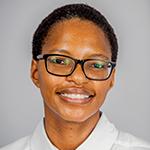
Pulane Makepe, a Sister of the Cross and Passion, made her perpetual profession of vows in June 2024. She is currently appointed to steward community affairs while living in an intergenerational community in Botswana. In addition to her community responsibilities, she is actively involved in ministry at the local parish and collaborates with other women religious and laypeople to address climate change issues. She also serves as the Botswana facilitator for a continent-wide project focused on the renewal of religious life for African women religious.
The short answer is the grace to perceive my vocation as a gift and to see how the "yes" of others to their vocation has been a gift to mine as well. I remember reading, in my early days of independent research on religious vocations and discernment tips from various, mostly online sources, comments along the lines of: "One's vocation is the way to God," or that it is the vehicle through which we go through life "until that day our souls are reunited with God."
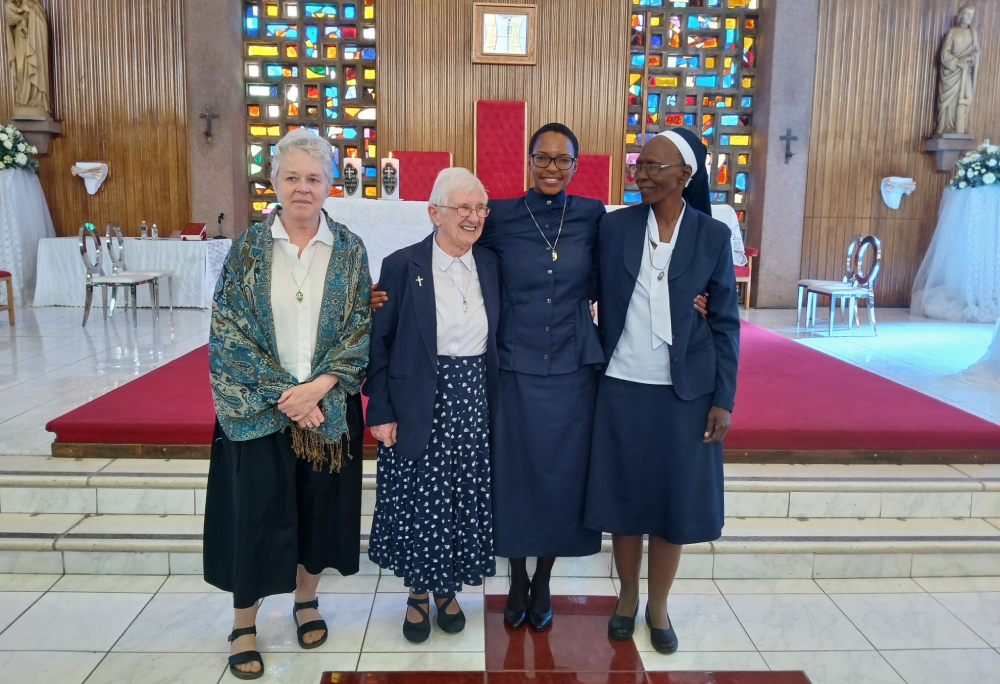
From left to right: Sr. Mary Ann Strain, Sr. Therese O'Regan, Sr. Pulane Makepe and Sr. Angela Kebakile. (Courtesy of Pulane Makepe)
What comes to mind is a chorus sung by gospel artists on some short reels on social media: "I'm going there, nobody can stop me, woo-hoo; I'm going there: don't you want to go too, woo-hoo?" The first time I heard it, the word "there" was actually home: "I'm going home, ohh, nobody can stop me, woo-hoo!" It sounded a bit morbid even though the tune is catchy. I certainly didn't hesitate to adopt the new version when I heard the change. Recalling it now, in the context of my own vocation, it carries a hopeful message at the core of its simple lyrics and tune.
Our call to holiness is at the heart of our Christian vocation. Even death is not an empty state devoid of meaning. It is not hopeless. We are hopeful because we will be reunited with the reason for our hope. And this gives us joy. Learning this helped me to stop thinking of my vocation or the rest of my life in a linear way, and instead see it as an unfolding, a becoming — not just in my experience, but in and through the shared experiences of others. Discussions in the synodal way happening in different places, among people from different walks of life, help us see both our shared vocation and our individual vocations in relation to each other.
Our call to holiness is at the heart of our Christian vocation. Even death is not an empty state devoid of meaning. It is not hopeless. We are hopeful because we will be reunited with the reason for our hope. And this gives us joy. —Sr. Pulane Makepe
I offer one example from this year. In my class with my budding young missionaries, after Mass on the last Sunday of July, I shared that it was the World Day for Grandparents and Elderly. Each student took turns telling us about the amazing older people in their lives — their favorite activities together, their routines, their secret language. I will never forget how that moment felt when time seemed to stand still. I didn't know my own grandparents and I have limited memory and a few photographs of one who passed away when I was very young. Hearing these children share about theirs, I was touched to realize that each one of them could form a prayer inspired by what we had learned in Mass that day, by listening to each other's stories and by recognizing how God had blessed them.
May we all grow in appreciation of our vocations, like Mary and Joseph and countless others. And may God bless your "Yes!"
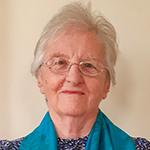
Rebecca Conlon, from Ireland, is a member of the Missionary Sisters of St. Columban. She began her mission in Korea as an occupational therapist before transitioning to congregational services including formation. After spending 33 years in Pakistan, where she worked pastorally with the Christian community and engaged in a dialogue of life and work with Muslims, she is now adjusting to life in Ireland. Dialogue was central to her mission approach. Additionally, she served on the Congregation Central Team for the past six years while residing in Pakistan.
Thirty five years ago, as the plane took off from Frankfurt airport, I put my head in my hands and wondered what awaited me on arrival in Pakistan. There was anxiety, no doubt. We were the pioneer group starting our mission there. Then a response came to me: Exploration into God.
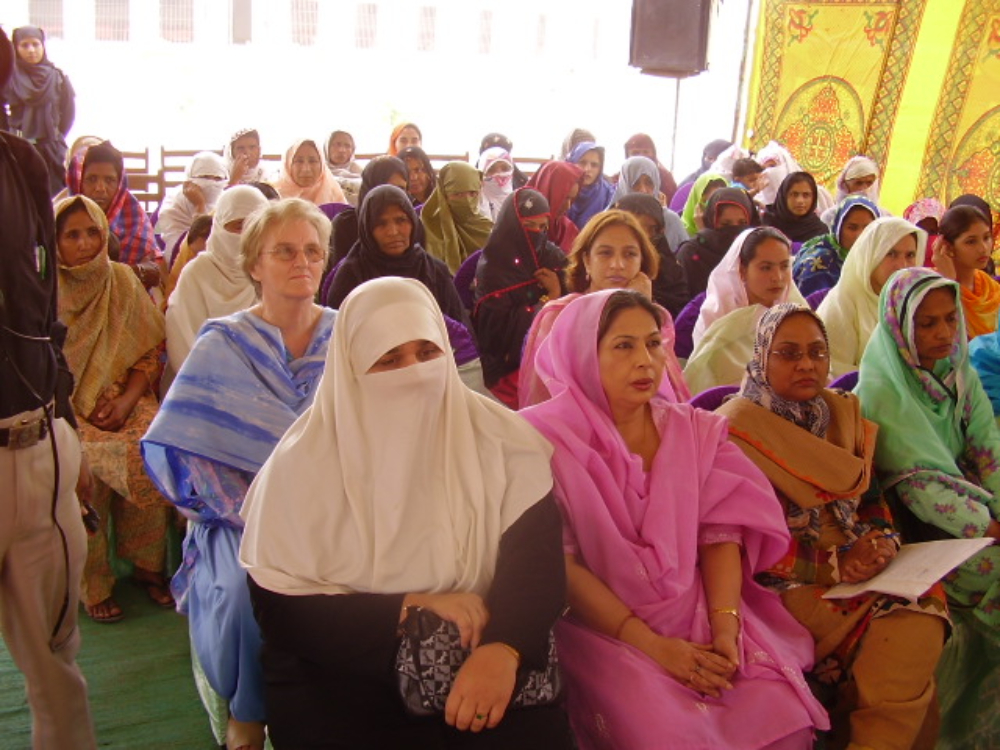
Sr. Rebecca Conlon at a multicultural event in the women's prison. (Jawed Munawer)
That said it all. The phrase alleviated my anxiety and gave me the energy to go for it! With this focus, all would be well.
Christopher Fry, in his poem "A Sleep of Prisoners," speaks of four prisoners of war locked in a church overnight:
When wrong comes up to face us everywhere,
Never to leave us till we take
The longest stride of soul we ever took.
Affairs are now soul size.
The enterprise is
Exploration into God.
Then he asks:
Where are you making for?
It takes so many thousand years to wake.
But will you wake for pity's sake!
Exploration into God is indeed a long, soul-sized-stride toward awakening, perhaps even "for pity's sake." This plea encapsulates the urgency of it!
In Pakistan, we gradually became awakened through exploring the god of the poor, the God of Christianity, Islam, Sufism, Hinduism, tribal traditions and the oppressed in their many cultures. Encountering all of these meant that the only way forward was through a heart of dialogue and openness to the mystery of the "other." That became our way of being on mission.
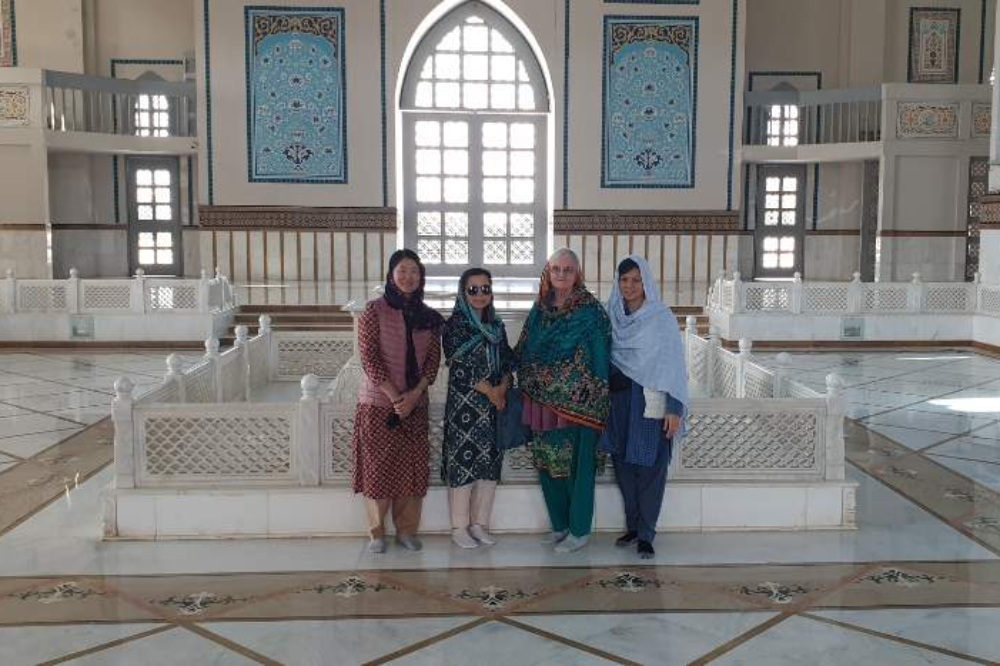
From left to right: Columban sisters Yoon Mi, Ha Suk, Rebecca Conlon and Anne Carbon at a mosque in Larkana. (Jawed Munawer)
Every religion explores its own path to God. What a privilege it is to inhabit the world of the "other," no matter how brief. These encounters with different beliefs, worldviews, struggles and perspectives can shake one's foundations. Or, as with Jacob wrestling with the angel, they can leave us limping from the encounter, yet blessed with a new name, a new direction.
Struggling with the radical differences of the "other," one emerges with new meaning, understanding and vision, enriched by the treasures encountered. Perhaps this is the place of transformation that Rumi points us towards:
Out beyond ideas of right and wrong there is a field.
I'll meet you there.
In this Kingdom space, Jesus, the "compassionate one," encourages us to explore the light we all possess in God, and to bring this light into a world, longing to be illumined.
The gift, then, is dialogue as exploration into God.





